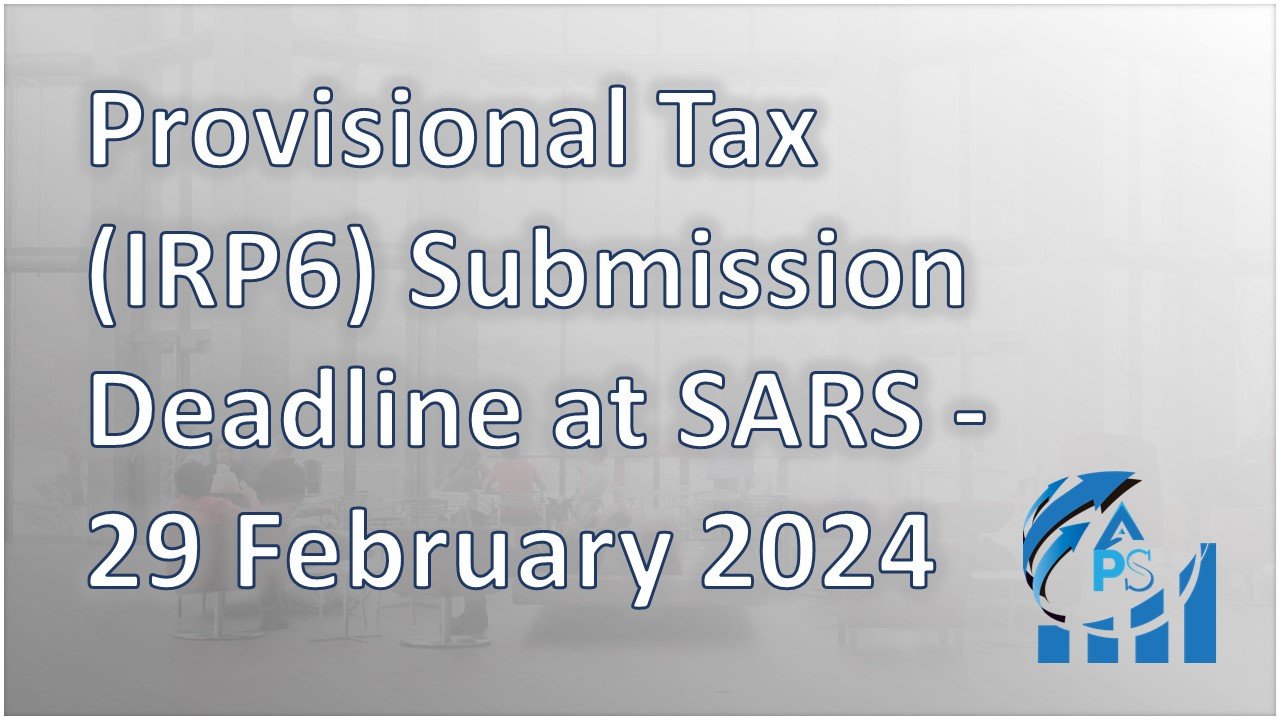14 February 2024
Provisional Tax (IRP6) Submission Deadline at SARS – 29 February 2024.
Provisional tax is not a separate tax from Income Tax. It is a method of paying tax due, to ensure the taxpayer does not pay large amounts on assessment, as the tax liability is spread over the relevant year of assessment. Final liability, however, is determined upon assessment. Companies automatically fall into the provisional tax system.
The first provisional tax payment must be made within six months of the year of assessment. The provisional return for the first period is forward-looking, requiring companies to estimate their taxable income for the year ahead and then paying tax on this estimate in advance.
The second payment must be made no later than the last working day of the year of assessment. The provisional return for the second period is retrospective, since by the year end there is more certainty regarding what exactly the income for the year was, and the tax payable thereon.
The third payment is voluntary and may be made:
- within seven months of the year of assessment, where the year of assessment is February, and
- within six months of the year of assessment, for any other year of assessment
A provisional return must be submitted by all provisional taxpayers. Even if your company owes no tax, a ‘nil’ return (i.e. taxable income is equal to zero) must be filed on time.
For companies with a financial year ending on 29 February 2024, the first provisional tax must have been done by 31 August 2023 and the next is due by 29 February 2024.
Don’t under-estimate your annual income Estimating the annual taxable income just six months into the year is rarely an easy task. Fortunately, under-estimating income for the first period does not attract a penalty, but the second estimate must be quite accurate (within 80 – 90% of the actual taxable income) to avoid the underestimation penalty.
Don’t pay late. The failure to make payment on time will result in an immediate late payment penalty, calculated at 10% of the provisional tax amount, whether it is not paid or simply paid late. For example, if the amount payable is R150,000 and is not received by SARS on the due date, a R15,000 penalty will become due immediately.
Furthermore, interest will be levied on the outstanding amount and will continue to accrue until it has been paid in full.
Be proactive. To avoid an underestimation penalty and interest, it is crucial to take proactively all the necessary steps to correctly calculate the estimated taxable income for the year of assessment.
Make certain that all sources of income are included. The estimated taxable income means gross income less exempt income plus all amounts included or deemed to be included in taxable income under the Act, for example, the amount of taxable capital gains.
Ensure that all rebates and amounts allowed to be deducted or set off are also factored in, including provisional payments already made for the year.
The provisions of the sub-sections of Section 89 and of the 4th Schedule to the Income Tax Act are daunting and can be confusing. Nevertheless, provisional taxpayers are ultimately responsible for their tax affairs and may therefore need expert tax advice to comply with the regulations and to avoid substantial penalties and interest. Similarly, where penalties and interest have already been imposed and levied, taxpayers may need expert assistance to successfully make a request for the remission of penalties and interest to SARS.
Should you have any enquiries, please do not hesitate to contact your Tax Practitioner or us on +27 (0)72 490 8099 or Gervasem@alertsprofessionalservices.co.za
Yours sincerely,
Gervase Mwango
(BA Ed; CA-ACCA; Postgraduate Diploma in Int.Tax-UJ)
Tax Practitioner No. PR0093056

